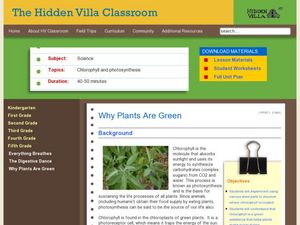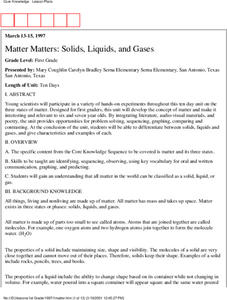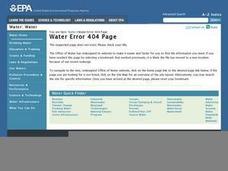NASA
Is It Alive?
Determining whether or not something is living can be more difficult than it seems. Put your young scientists to work defining their own criteria to identify life, then work with three samples to see if they are alive or not.
Outside Education
Water Cycle Adventure
Evaporation, transpiration, condensation, precipitation, accumulation. Steam, clouds, rain, lakes. Guide your class members on an imaginary journey through the water cycle with a water cycle adventure script.
Curated OER
The Marvels of Mud
Young scientists roll up their sleeves and get a little dirty in this three-day earth science investigation. Following the scientific method, children monitor the growth of algae in pond water samples in order to determine the role that...
Polytechnic Institute of NYU
Potential vs. Kinetic Energy
Legos in science class? Watch your pupils fall in love with this activity. After learning to measure potential and kinetic energy, young scientists create their own ramps using Lego Mindstorm sensors and software.
Center for Learning in Action
Introduction to Matter
Begin your states of matter lessons with a demonstration designed to introduce the concept that all matter has properties. Reinforce this concept through vocabulary exploration, and the creation of atom models; salt, water, and carbon...
Center for Learning in Action
Introduction to the States of Matter
Liquids, gases, and solids are the states of matter in which scholars investigate in a lesson plan that offers in-depth information and engaging activities that look into the three states and the changes their properties make when mixed...
Center for Learning in Action
Water—Changing States (Part 1)
Here is part one of a two-part lesson in which scholars investigate the changing states of water—liquid, solid, and gas. With grand conversation and up to three demonstrations, learners make predictions about what they think will happen...
Curated OER
What is a greenhouse?
Students experiment to gain understanding of how a greenhouse retains heat. In this greenhouse instructional activity, students work with soda bottles and simulate a greenhouse. Students compare data from a vented and intact bottle....
Curated OER
Atmospheric Processes - Conduction
Students explain the process of conduction using a molecular explanation, and explain how different materials conduct at different rates.
Curated OER
Why Plants Are Green
Learners discover the properties of chlorophyll in plants. In this plant biology lesson, students conduct an experiment to find where the chlorophyll in the plant is located. Learners are split into small groups and study plant parts....
Curated OER
Convection Activities
Students conduct a series of hands-on activities to demonstrate that heated air expands and that warm air rises because it is less dense.
Curated OER
Matter Matters: Solids, Liquids and Gases
Scientists participate in a variety of hands-on experiments in this ten-day unit on the three states of matter. Lessons incorporate literature, a-v materials, and poetry to help students differentiate between solids, liquids and gases.
Curated OER
Making Molecular Models
In these creative hands-on activities, students construct several different molecular models that represent substances that play an essential role in our nutritional needs. Using gum drops and toothpicks, students design the models....
Curated OER
Do You Know the Master Programmer?
Fourth graders, using candy, build models of DNA replication, RNA transcription, and tRNA translation.
Curated OER
Thirstin's Groundwater Movement Activity
Students examine how ground water flows through different materials. In groups, they identify the different types of rocks in various aquifers. To end the lesson, they pretend to be water as others pretend to be rocks and try to make...
Curated OER
Ice Floats
Students explore the changing density of water. In this physics lesson, students investigate how an object's density determines whether it will float or sink in water. They explain why this unique property of is important to living things.
Curated OER
Water Cycle Activity
Students build a model and observe the cycle of evaporation and condensation that occurs in the water cycle. They see how the water cycle works, such as water condensing on the side of the jar and drops precipitating into rain that...
Curated OER
Properties of Water with a Splash of Color
Learners explore the properties of water. In this cross curriculum art and physical science lesson, students experiment with a variety of materials to demonstrate the cohesive forces and adhesion of water. Learners create a water color...
Curated OER
Boot Reer Root Beer
Fifth graders investigate chemical reactions. In this physical science lesson, 5th graders make dry ice root beer and identify the type of change that occurs to the root beer mixture.
Curated OER
The Cool Forms of Water
Learners discover the different forms of water on Earth. In this states of water lesson, students read material on the different forms of water and how they are created. The learners answer written questions on worksheets.
Curated OER
Soak it up
Learners complete a hands on activity using hard boiled eggs, food coloring, tape, cups, water, and a knife to show how permeability affects animals. In this permeability lesson plan, students complete this activity and learn how...
Curated OER
Animals of the Fire Ice
Students examine ocean life by identifying methane hydrates. In this ocean life lesson, students research organisms that live in the coldest, deepest parts of the ocean and live off methane hydrates. Students create a group...
Curated OER
Mixtures of Matter
Learners experiment with mixtures of matter. For this matter lesson, students investigate which liquids form a solution when mixed together and which do not. Learners also identify which solids can be separated from matter.
Curated OER
What is Plastic?
Learners experiment with plastics. In this what is plastic lesson, students make a simple polymer and discuss recycling. Learners identify various types of plastics.
Other popular searches
- Atoms and Molecules
- Gumdrop Atoms and Molecules
- Atoms & Molecules
- Compounds and Molecules
- Water Molecules
- Organic Molecules
- Atoms Molecules
- Building Molecules
- Molecules of Life
- Gas Molecules
- Matter and Molecules
- Biological Molecules

























